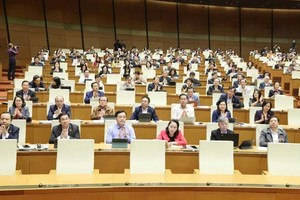
At today’s workshop on the harmful effects of sugary drinks on health and the role of tax policy in controlling consumption, Chief Representative of the World Health Organization (WHO) in Vietnam Angela Pratt said that for a healthier nation, it is necessary to start implementing some measures to reduce consumption of sugary drinks.
The WHO Representative in Vietnam defined that sugary drinks can be carbonated or non-carbonated soft drinks, fruit and vegetable juices, flavored water, energy drinks, and instant tea, instant coffee and milk with added sugar.
According to Ms. Angela Pratt, consumption of sugar-sweetened beverages enhances the risk of type 2 diabetes, tooth decay, and the prevalence of obesity and obesity-related diseases. Furthermore, consuming a lot of sugary drinks also causes a burden on individuals and society by increasing health care costs, reducing labor productivity due to illness, and affecting quality of life. Many scientific studies have shown a link between sugary drinks and heart disease, especially stroke and heart attack.
In Vietnam, in the past 10 years, people have consumed more sugary drinks; each person averagely consumes about one liter of sugary drinks a week.
Therefore, not surprisingly, the rates of overweight and obesity have been rising rapidly, especially among young people. In cities, more than 1 in 4 people aged 15-19 are overweight or obese. Therefore, the Vietnamese government needs to take drastic action to reverse this trend, said Ms. Angela Pratt. At the same time, she said that countries in the world have implemented taxes on sugar-sweetened beverages to reduce consumption with the aim of lessening the harmful effects of sugary drinks. In fact, to date, more than 100 countries have applied special consumption taxes on sugary beverage products.
Dr. Angela Pratt said that raising the price of sugar-sweetened sodas, coffees, teas and energy, sports and fruit drinks by an average of 10 percent reduced consumer purchases of those drinks by 11 percent.
Along with that, the WHO representative also recommends measures including nutritional labeling on the front of drinks, limiting advertising, limiting sugary drinks in schools and educating children about healthy nutrition.
According to a representative of the National Institute of Nutrition, to limit sugar consumption, consumers should limit the addition of sugar and use low-sugar or sugar-free products to ensure the body has a healthy balance between nutrition. The amount of free sugar consumed per day should not exceed 25 grams. Children under 2 years old should not consume any foods or drinks with added sugar.
























